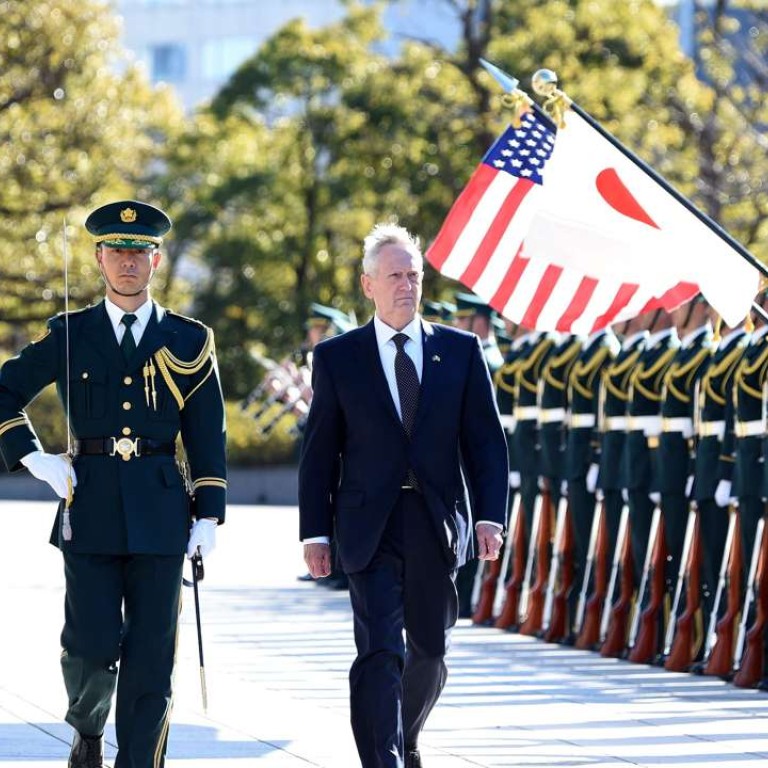
US defence secretary Mattis pushes diplomatic solutions, but Beijing remains wary of Trump administration
US defence secretary takes soft line on South China Sea disputes
A softer line taken by US Defence Secretary Jim Mattis over the South China Sea on Saturday may help clarify Washington’s stance, but Beijing is likely to remain very cautious on the rhetoric of President Donald Trump’s administration, Chinese analysts said.
Speaking in Tokyo with his Japanese counterpart Tomomi Inada as he wrapped up his first overseas trip, Mattis played down any need for major US military moves in the South China Sea.
“What we have to do is exhaust all efforts, diplomatic efforts, to try and resolve this properly. Our military stance should be one that reinforces our diplomats,” he said.
“At this time, we do not see any need for dramatic military moves at all.”

However, Mattis said, China, which claims most of the waters in the South China Sea, had “shredded the trust of nations in the region, apparently trying to have veto authority over the diplomatic and security and economic conditions of neighbouring states”.
His remarks came as countries in the region watched for any changes in US foreign policy under Trump, especially in the disputed South China Sea, where fears of armed conflict between the world’s two major powers remain high.
Mattis’ reaffirmation on Friday that the Trump administration would abide by the previous US stance that the US-Japan security treaty applied to defending Japan’s administration of the disputed Senkaku islands, called the Diaoyus by China, drew criticism from Beijing.
Chinese Foreign Ministry spokesman Lu Kang called on the United States to avoid discussion of the issue and reasserted China’s claim of sovereignty over the uninhabited islands.
Wu Xinbo, a professor at Shanghai’s Fudan University, said Mattis’ latest remarks highlighting diplomatic efforts in the South China Sea disputes were a means for Beijing to learn Trump’s policy, amid speculation that the new US government would take a tougher stance over China than the previous Barack Obama administration.
Professor Shi Yinghong, from Renmin University in Beijing, said there was no obvious indication the Trump administration would be soft on China, given previous harsh remarks from other officials as well as the unpredictability of Trump’s foreign policy thus far.
“I think Mattis’ comments mean that the Trump administration so far has no better solution on the South China Sea disputes, but we can’t say that this will be the future strategic direction [of the administration’s South China Sea policy] just because [Mattis] spoke in a softer tone,” Shi said.
Meanwhile, top Chinese diplomat Yang Jiechi had a phone conversation with Michael Flynn, the national security advisor of the Trump administration, on Friday, in the first publicly disclosed high-level interaction between Beijing and Washington since Trump was inaugurated on January 20.
Yang told Flynn that China hoped the new US government would work with China, “to strengthen high-level and other exchanges, maintain the political foundation and expand the political basis of bilateral relations, and manage and control disputes and sensitive issues”, the Chinese foreign ministry said in a statement released late on Friday night.
Both sides also discussed other regional issues, the statement said, without giving further details. The White House has not yet released any details of the call.
Renmin University’s Shi said Yang was likely to have touched on Taiwan issues in his call with Flynn.
Liu Qing, from the China Institute of International Studies in Beijing, said Beijing would be cautious of any comments from the Trump administration.
“Beijing is taking a defensive stance, because the Trump administration is aggressive to everyone, not only China, but also its allies,” he said.
Additional reporting by Reuters, Associated Press

